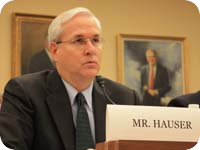Report from Washington, D.C.
U.S. Losing Its Lead in Space
Written by: developer
 Marty Hauser, Space Foundation vice president for Washington operations, research and analysis (pictured), represented the organization at a Congressional hearing Nov. 19, hosted by the House of Representatives Committee on Science and Technology Subcommittee on Space and Aeronautics.
Marty Hauser, Space Foundation vice president for Washington operations, research and analysis (pictured), represented the organization at a Congressional hearing Nov. 19, hosted by the House of Representatives Committee on Science and Technology Subcommittee on Space and Aeronautics.
Hauser provided members of Congress with insight into the growing trend of international space capabilities, the important impact of that growth, and the issues Congress should address as it decides the future direction of the United States space program. He warned that the U.S. is rapidly losing a leadership position in space, and he described China’s “state-of-the-art” rocket launch facilities.
“Others are catching up fast,” he said. “Of particular note over the past decade is the emergence of China’s human spaceflight capabilities.”
Other panel members included: J.P. Stevens, vice president of Space Systems for the Aerospace Industries Association; Dr. Scott Pace, director of the Space Policy Institute at George Washington University; Dr. Kai-Uwe Schrogl, director of the European Space Policy Institute; and Dr. Ray Williamson, executive director of the Secure World Foundation.
Representatives attending included:
- Chairwoman Gabrielle Giffords (D-AZ)
- Ranking Member Pete Olson (R-TX)
- Rep. Parker Griffith (D-AL)
- Rep. Dana Rohrabacher (R-CA)
- Rep. Suzanne Kosmas (D-FL)
- Rep. Marcia Fudge (D-OH)
- Rep. Ralph Hall (R-TX)
- Rep. John Garamendi (D-CA)
Major themes discussed at the hearing were:
- Concern the U.S. could become irrelevant as other nations grow their space capabilities
- The need for stable programs with stable funding in the U.S.
- More countries than ever are part of the “space club”
- Cooperation, at this time, is good, but needs to be equitable
- Cooperation is very good, in terms of dealing with global challenges like climate monitoring
- Agreement that nations are involved in space for the same reasons (prestige, high-tech development, national security, and economic competitiveness)
- ITAR needs to be modernized
Hauser also took the opportunity to discuss the Space Foundation education programs, its partnership with Charles County (Md.) Public Schools, space networking events hosted by the Space Foundation, such as the National Space Symposium, and The Space Report 2009: The Authoritative Guide to Global Space Activity.
Attending members of Congress seemed to agree with many of the concerns raised regarding affects to the U.S. industrial base, lack of stability in civil space programs, ITAR restrictions, and the need for greater cooperation with international partners.
This article is part of Space Watch: December 2009 (Volume: 8, Issue: 12).
